Records Page is an organization committed to developing free resources and public services that further public records’ transparency and safeguard civil liberties.
Through our guides, citizens learn how to exercise their rights if criminal records are used in a discriminatory manner, as well as how to make public record requests to see what information is considered public records.
Our mission is to combat the misuse of criminal records so people with a criminal history are not unfairly denied opportunities such as housing, employment, licensing, and education while promoting transparency.
Our free resources enable anyone to learn about what protections are in place and what actions can be taken when facing discrimination. Additionally, citizens can see publicly available information by learning how to find, navigate and search federal, state, and local government repositories such as law enforcement agencies, courts, vital records offices, and more.
Public information that can be sought out through government databases includes but is not limited to:
- Criminal records (felonies, misdemeanors, probation, parole, background checks, warrants, motor vehicle infractions, and more)
- Offender registries (offenders ranging from violent offenders, domestic abuse
- Arrests records (inmate logs or recent arrests, mugshots, police reports etc.)
- State and federal prisoner records (where a prisoner is located, visitation hours and how to contact them)
- Court records (crimes, small claims, litigations, estate probate, marriage and divorce records, child support, adoption, domestic abuse, bankruptcy and more)
- Vital records (marriage, divorce, birth, or death certificates)
- State or federal government records
- Property records including liens, levies, and taxes
- Tax records
- Reverse address lookups
The Availability of Public Records
The information above is, in part, made available through the Freedom of Information Act (FOIA), which regulates government documents from federal agencies and the executive branch.
Furthermore, each state has its own Public Record Law or Freedom of Information Act that governs the availability and distribution of records surrounding state institutions and, as a byproduct, individuals’ information documented by government agencies. Each state has FOIA-inspired laws or acts, and the restrictions and limitations vary.
While these statutes make public records readily accessible, several agencies and statutes are in place to protect how public records and criminal records are obtained and to ensure they used ethically.
Your Rights Regarding Public & Criminal Records
While public records can be sought out for personal or professional purposes, both uses have stipulations to ensure they’re not misused.
Professional public record searches are commonly referred to as background checks and may be necessary for employment, housing, licensing, volunteering, and other purposes. However, these searches can not be done on a whim since they must comply with the Fair Credit Reporting Act, among other laws, regulations, and governing bodies, including but not limited to:
- The Fair Credit Reporting Act (FCRA) – limits the reporting of most crimes to 7 years (10 years for bankruptcy) and among other rights, ensures informed consent, the ability to review and correct the background check report for inaccurate information, and informs the applicant if information from a pre-employment background check was used to make an adverse employment decision as well as the right to appeal a decision.
- The Equal Employment Opportunity Commission (EEOC) – enforces equal employment opportunities and ensures background checks are non-discriminatory.
- The Fair Trade Commission (FTC) – manages fraudulent matters, such as when a background check is done without the applicant’s permission.
- Ban the Box Laws – are only applicable in some states but prohibit employers from asking about an applicant’s criminal history on job applications or until later stages in the hiring process.
- The Fair Housing Act – oversees issues surrounding housing discrimination.
- State, County & City Employment Laws – offer additional protections and vary between jurisdictions.
If a background check was used discriminatorily, individuals may contact the Equal Employment Opportunity Commission or EEOC at +1-800-669-4000 or +1-800-669-6820 (TTY).
Furthermore, if a background check or public records search was conducted without permission for matters such as employment, housing, credit lines, insurance, licensing, and/or government benefits, the Federal Trade Commission or FTC can provide assistance. The FTC can be contacted at +1-877-382-4357 or +1-866-653-4261 (TTY).
There is an abundance of protections in place and legal counsel may help navigate the intricacies of local laws and regulations and determine the best course of action in a given situation.
On the other hand, public record searches for personal uses can help find genealogy or family history by looking through marriage and divorce records of friends, family, or colleagues. Or they can be done for safety reasons like checking if an acquaintance has a history of violence by checking probation, parole, warrant, offender, and prisoner records.
Public records provide valuable insight and offer transparency, but they must not be used to stalk, harass, or intimidate others; and local laws and regulations regarding privacy and the ethical use of public records must be adhered to.
Obtaining Public Records: The Basics
When obtaining personal public records or public information on another person, a systematic approach should be taken to avoid wasted efforts or shortcomings.
For example, searching for court cases, bankruptcy information, recent arrest, and marriage information seems simple enough, but the processes, government organizational structure, and record keepers vary between each state and jurisdiction, which adds extra layers of complexity.
Figuring out where a record originated can make or break a search, so searching for others’ information boils down to three primary steps, although personal searches can skip step one::
1. Approximating where the record was made (i.e., what state, county, or city did the arrest, marriage, warrant issuing, etc. take place)
2. Figuring out who can view particular records or if they’re open records
3. Determining which agency handles those records in a particular jurisdiction
After these three steps, the final action is simply searching for the record using the person’s first and last name online, in person, or by first and last name.
This guide goes over each of these steps although the exact steps differ between each state and record custodian. To find more information on a particular state, scroll down to the public record and criminal record tables and click on the state where the record originated to see state-specific information or guides.
1. Figuring Out Where the Record Originated
When searching for public records, it’s imperative to pinpoint where the record was made or at least know the vicinity. Consider the following when approximating where a record was made or where the event occurred:
- What state does the person live in or work?
- What county does the person live in or work?
- What city or town does the person live in or work?
- Where else has the person lived, worked, or visited?
Where did the record originate? - Where was the person born?
- Were they traveling at the time of the event?
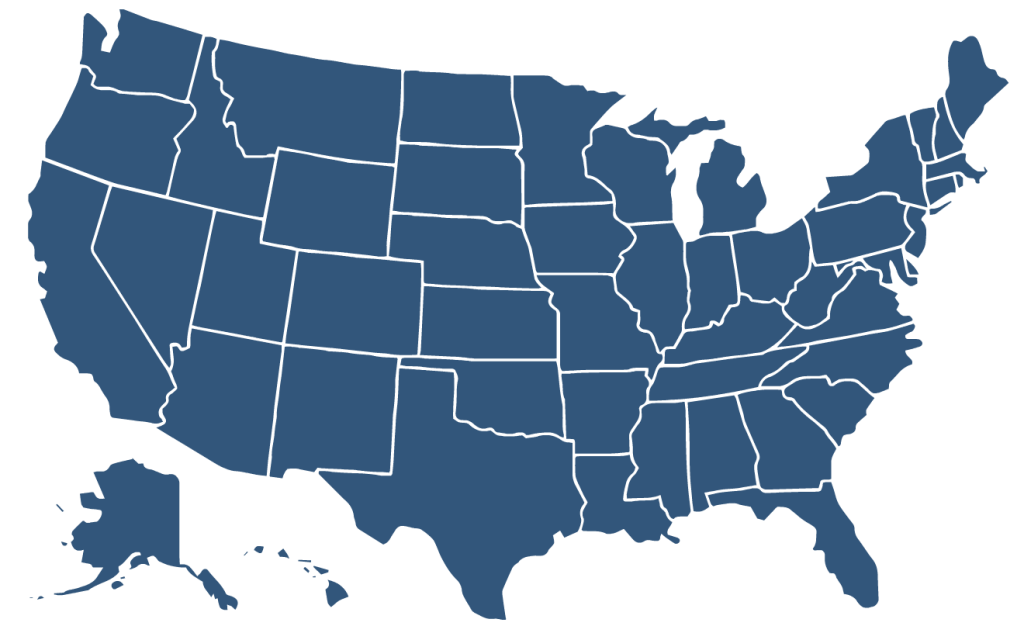
The alternative is manually checking every city, county, and state record individually.
But for searchers who have an idea of where the record originated, the guides linked in the table below provide state-specific information regarding public record requests through state, county and city agencies:
If a particular type of record can’t be pinpointed because the location of the event is unknown, people search services or third-party aggregate sites may provide further insight since they search databases nationwide.
2. Determining Which Public & State Records Are Publicly Accessible
The Freedom of Information Act and lemon laws within a state give citizens the right to obtain public information such as criminal history, arrest records, mugshots, inmate status, court records, warrant checks, bankruptcy data, sex offender registries, lien status, tax records, driving records, marriage and divorce records and more.
However, each state has different laws, record custodians, and search tools that govern this information. For example, Georgia has a felon search tool but nearly every other state makes searchers dig through local court records to determine if someone is a convicted felon.
Additionally, some states have their version of ban-the-box laws that battles criminal record discrimination by prohibiting employers from asking about criminal records on a job application, or at least until later stages of the hiring process.
It’s clear a state-specific lookup is required, but figuring out who the record custodian (a group or individual who handles certain documents) will often shed light on whether or not the information is available in a particular state.
3. Locating Record Custodians & Search Tools
Anyone can pay for a third-party search tool to find public records, but finding which governmental directory the information originated from can prove difficult since official resources can be buried in the abundance of online information.
Additionally, some records can be sealed, expunged, barred from the public eye, or only accessible by law enforcement agencies.
Luckily, many of the same sites that offer people searches also offer state, county, and city resources so that the information can be found for free or at a lower cost. These sites compile links, laws, and directories to make finding public records easier.
Finding the right record custodian is usually a matter of checking the web for the right government agency or repository, but a grasp of government structures and functions can help narrow the search. Sites like Records Page can also help pinpoint the right agencies to check with, but readers should always perform their due diligence.
4. Requesting & Searching Public Records (How-To-Resource)
Once an individual knows which state or jurisdiction to look in, determines if the records are viewable, and determines which agency handles the record, requesting the records becomes a breeze.
How To Determine if Someone Has a Criminal Record
Criminal records can be hosted in many directories, such as jail records, court records, or background check repositories which we touch on below.
Some states even allow state residents to request a person’s criminal history for a nominal fee. In contrast, other states allow residents and non-residents to search a person’s criminal history. For example, anyone can search criminal records in California without needing to provide or state a reason.
However, a minority of states only share criminal history information with employers and other criminal justice agencies, so it’s dependent on where the searcher resides.
Regardless, there are plenty of other places to check, such as:
- Arrest and jail records
- Probation and parole information
- Warrant lists
- Prison records
- Court records
- Sex offender records
- Felon records
- Drug abuse and manufacturing records
For the states or jurisdictions that do not have online repositories, criminal records can still be obtained by visiting the appropriate agency or by filing a public record request. Most agencies allow searchers to request a person’s criminal history either online, in person, or via mail for free while others require a nominal (small) fee.
In either case, searchers learn how to search criminal and arrest records in any given state and county by clicking on the state-specific guides below:
| State Specific Guides To Search Criminal Records & Arrest Records | |||
| Alabama | Indiana | Nebraska | South Carolina |
| Alaska | Iowa | Nevada | South Dakota |
| Arizona | Kansas | New Hampshire | Tennessee |
| Arkansas | Kentucky | New Jersey | Texas |
| California | Louisiana | New Mexico | Utah |
| Colorado | Maine | New York | Vermont |
| Connecticut | Maryland | North Carolina | Virginia |
| Delaware | Massachusetts | North Dakota | Washington |
| Florida | Michigan | Ohio | West Virginia |
| Georgia | Minnesota | Oklahoma | Wisconsin |
| Hawaii | Mississippi | Oregon | Wyoming |
| Idaho | Missouri | Pennsylvania | |
| Illinois | Montana | Rhode Island | |
If the searcher knows the particular record they’re searching for and understands how to sort through various record custodians, these same records can usually be found by searching the internet using queries such as:
[State, County or County] [Type of Record] Search
I.e. Texas criminal record search
I.e. Dallas County felon search.
It’s important to note that a minority of states only allow state-residents to initiate public record requests and even fewer states such as California only share criminal history information with employers and other criminal justice agencies.
How Do I Check if Someone Was Arrested Recently or Is in Jail?
Finding out or wondering if someone is in jail can be stressful and overwhelming, so it’s best to remain calm and think pragmatically. To begin with, take into account which jails are in the area and where the person may have been detained.
Many major cities have a “city jail” operated by a local police department which may have an online inmate roster or search tool that shows recent arrests and mugshots, which are typically hosted on the official city website or the local police department’s site.
For example, searching Google for “Las Vegas city jail” shows Las Vegas Detention Center’s inmate search tool as the first result. This is a .gov site where users can search for jail inmates by first and last name. Again, some city and regional jail inmate finders are located on the police department’s or detention center’s (jail’s) website.
The same applies to county jails, but local sheriff departments usually operate them.
Furthermore, searching for “Clark County jail inmate search” leads searchers to Clark County’s inmate search tool, which is hosted on the county website. More guidance on finding details on anyone incarcerated here is provided in the Clark County arrest lookup resource.
However, some county inmates will be found through a local sheriff’s department’s site, such as Tulare County’s sheriff office in California.
To find the official police department or county sheriff’s office website, type one of the following into a search engine of your choice:
“[name of county] inmate search”
“[name of city] inmate search”
When there is a county jail and city jail nearby, always check with the county sheriff’s office first since it’s a broader search but check both to ensure thoroughness. If there is not an online inmate search tool available, calling the local sheriff’s office, county jail, regional jail, local police department and/or local jails can prove fruitful as well.
If nothing can be found through the steps above, an attorney, bail bond agent, or third-party site can help look into surrounding areas or provide more information.
Where Can I See Mugshots of Arrestees?
Interested parties can find out why they were arrested and mugshots using the local jail look-up tools seen above.
However, in some states, it’s best to search through court records for recent arrest records, but this boils down to which agency is the record custodian in that particular jurisdiction.
How To Run a Background Check on Someone
Anyone can run a background check on themselves or someone else if it’s for a personal reason. Furthermore, the searcher doesn’t need the person’s explicit consent for lower-level background checks through third-party background check sites or, on occasion, state resources.
On the other hand, employers, landlords, business partners that need to perform due diligence or anyone else running a background check for official purposes must obtain an individual’s explicit consent and use a background check service that’s complies with local and federal laws such as the Fair Credit Reporting Act.
These types of background checks are usually done through state agencies and government repositories; they range from Level 1-4 Background checks, FBI Background Checks, and beyond.
These background checks are usually done through state agencies and various government repositories. However, there are several types of background checks, with level 1 and level 2 being the most common in professional settings.
A Level 1 background check is name-based and checks records within a state, while Level 2 background checks are fingerprint-based and check FBI records from across the country.
Regardless of the reason, some information that shows up on a background check includes:
- Criminal history
- Identity verification
- Employment verification
- Motor vehicle reports (traffic and parking tickets)
- Past and/or current addresses
- Education
- Rental history
- Credit history
- Police reports
- References
- Professional licenses
- Arrest records (even non-convictions)
Most states do not provide personal background check services, so interested parties must usually search some criminal record repositories, court records, or third-party sites. However, some states have a tool similar to Colorado’s Internet Criminal History Check System, which allows individuals to run a criminal background check or screen anyone with a criminal record in CO.1
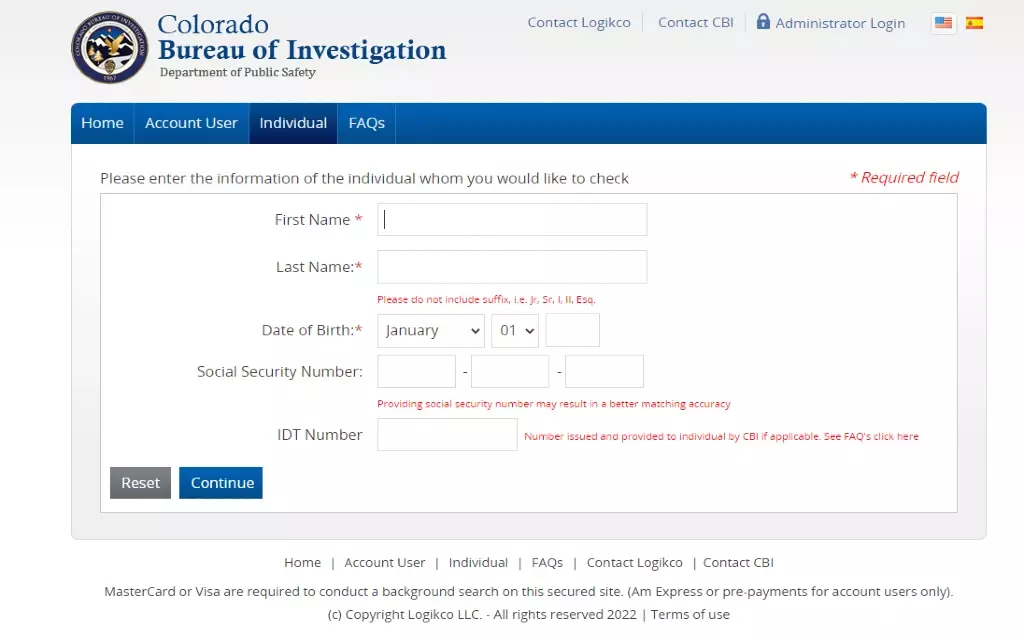
How To Look Up Court Records & Cases
Every state’s judicial system works a little differently, and even though most court records are available to the public, there are exclusions when it comes to juvenile records, national security, witness protection, protective orders, adoption cases, and more.
On the other hand, commonly available court records include:
- Minor infractions like motor vehicle reports (driving records).
- Misdemeanors such as domestic violence.
- Even felonies, including DUIs or aggravated robbery.
Searching Federal Court Records: Federal court cases can be found through PACER (Public Access to Court Electronic Records), which contains appellate, district, and bankruptcy documents. Older federal cases were filed on paper before 1999 and can be found in the National Archives Court Records.
Locating Local Court Records: Locating local court records is as simple as narrowing down which court handled the case and requesting the information online or in person. For those unsure of which courts are nearby, here’s a list of state courts and list of county and municipal courts.
Each court will have its online lookup tool and/or process to request the documents in person. Some courts even have public access terminals where residents can search court records for free, but there may be a nominal fee.
Free Warrant Searches
When it comes to finding out if someone has a warrant for free, there’s a few methods but the primary method involves checking county court records. Many states have a unified court records search which makes it possible to check several counties at once, but most states force the searcher to check county-by-county.
Searchers looking for warrants should type into Google, “Warrant Searcher + [County]” and most of the time, they will be led to their state court search system or county court search system. However, some County Sheriff’s offices may keep track of warrant searches and the user may want to check their local County Sheriff’s website instead.
Note: Always make sure the website is an official website and not a third-party service; this can usually be done by ensuring it’s a .gov website.
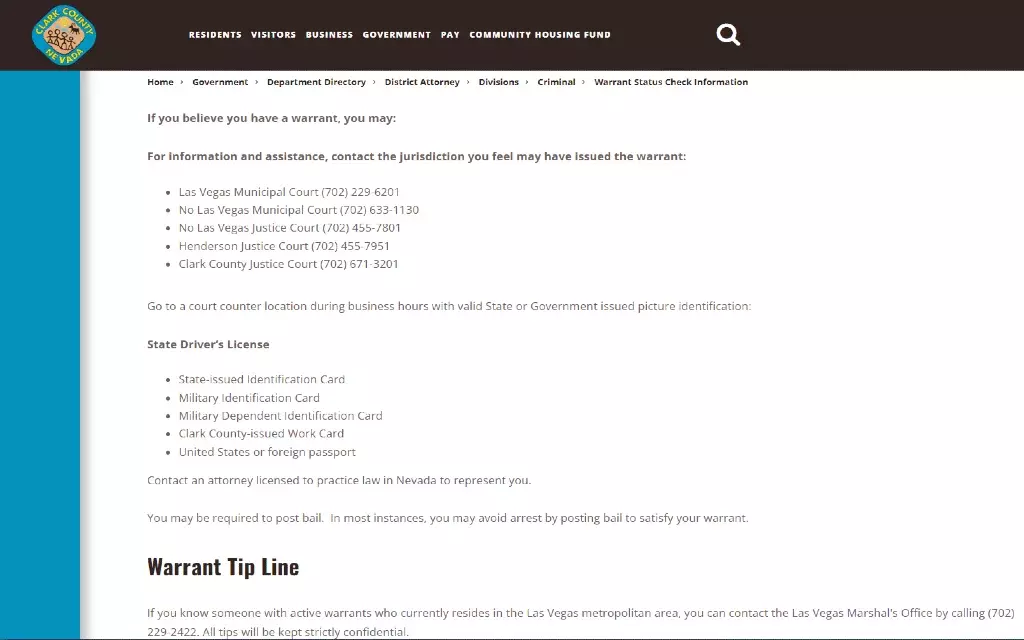
If an online warrant checker can not be found, searchers are encouraged to call their local court, call their local sheriff’s office. and if all else fails, hire an attorney or lawyer to get assistance in finding out if they have a warrant for their arrest.
How To Track Down Inmate Records of Federal & State Prisoners
Locating an inmate can be tricky, but knowing the difference between jails, state prisons, and federal prisons can help narrow the search.
Jails are used for shorter sentences, individuals awaiting pretrial, or as holding tanks until the person posts bail, and the section below describes how to find someone who was recently arrested.
Prisons are reserved for more serious offenses, and there are state prisons and federal prisons.
State prisons hold individuals who committed a serious offense enforced by the state, while federal prisoners are for those who committed federal offenses (tax evasion, identity theft, counterfeiting, and other white-collar crimes).
Most convicts are in state prisons; thus, most prisoners can be located using a state’s Department of Correction (DOC) inmate locator. Follow these steps to find a state prisoner:
1. Find a state’s Department of Corrections website through USA.gov’s DOC explorer 3
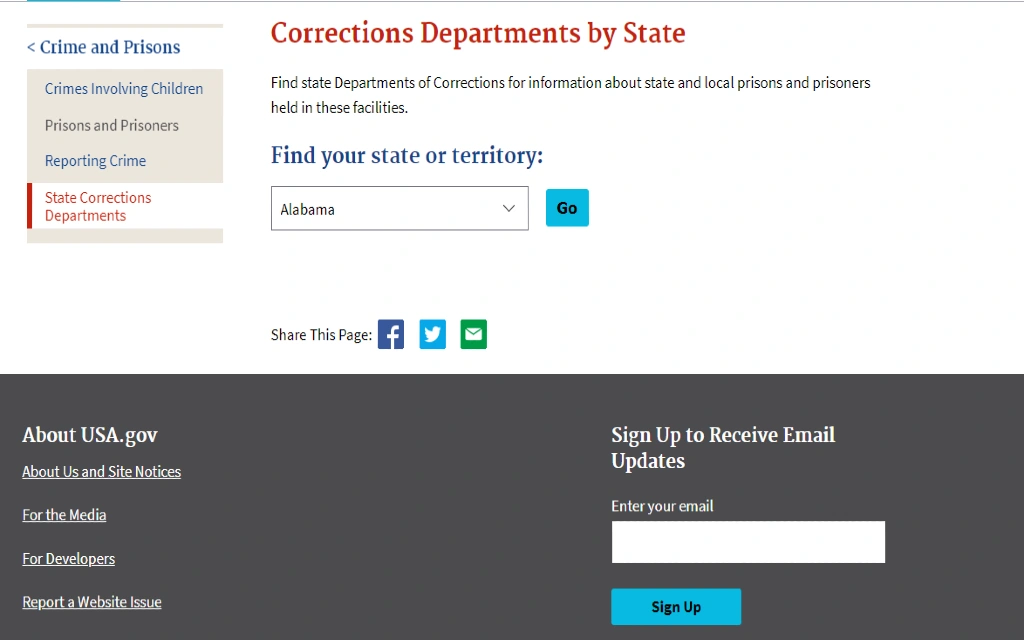
2. Check the site’s home page and menu for the key phrases “inmate finder”, “locate an inmate”, “inmate search” etc.

3. Search by first and last name
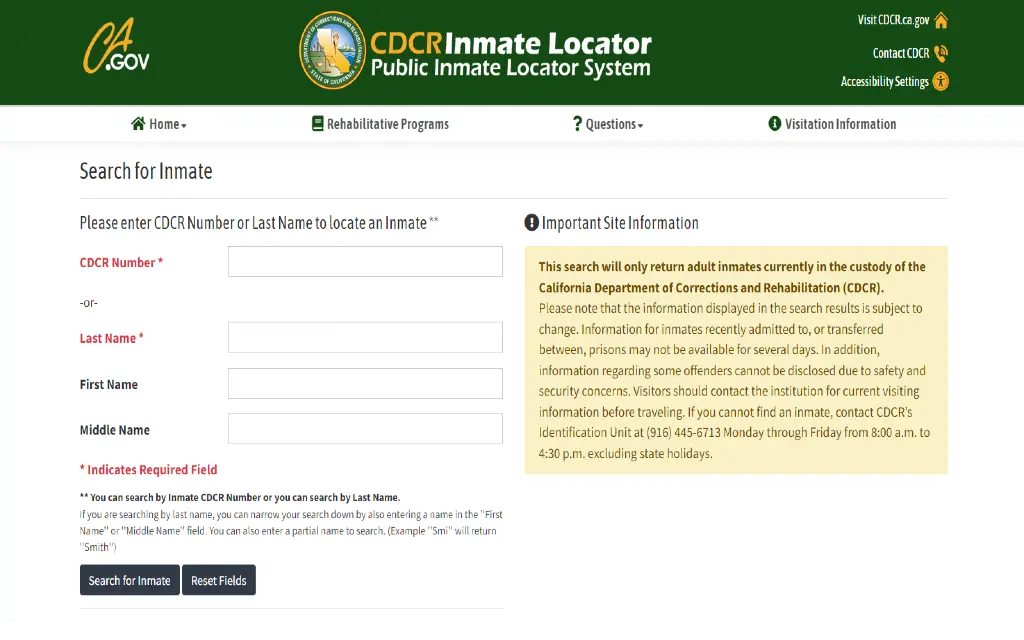
If that doesn’t turn up any results, VINELink, a state-sponsored victim notification network, also allows people to search state inmates by name, case number, or ID number and the search reveals where the inmate is located, their mugshot, court hearings, release dates, and allows “custody status alerts” to be set.
Those in federal prison can be found using the Bureau of Prisons (BOP) Search Tool. Federal prisoners can be found using the link above and searched by first and last name or by their BOP Registry Number.
How To Access or Request Copies of Vital Records
Vital records are certificates issued for major life events such as a birth, death, marriage, or divorce, and every jurisdiction’s vital records have various restrictions on who can access these records.
A few states allow anyone to access recent vital records, but most states only allow authorized individuals to access vital records. Authorized individuals can be parents, grandparents, siblings, legal guardians, or legal heirs, but authorized individuals vary by state laws.
Despite the restrictions on who can access this information, third-party search sites check government resources and other online sites like social media so they may have more information where access to vital records is restricted.
Additionally, marriage and divorce rates are made public by the U.S. Census Bureau, and the image below shows the percentage of divorced individuals in each state in the United States:
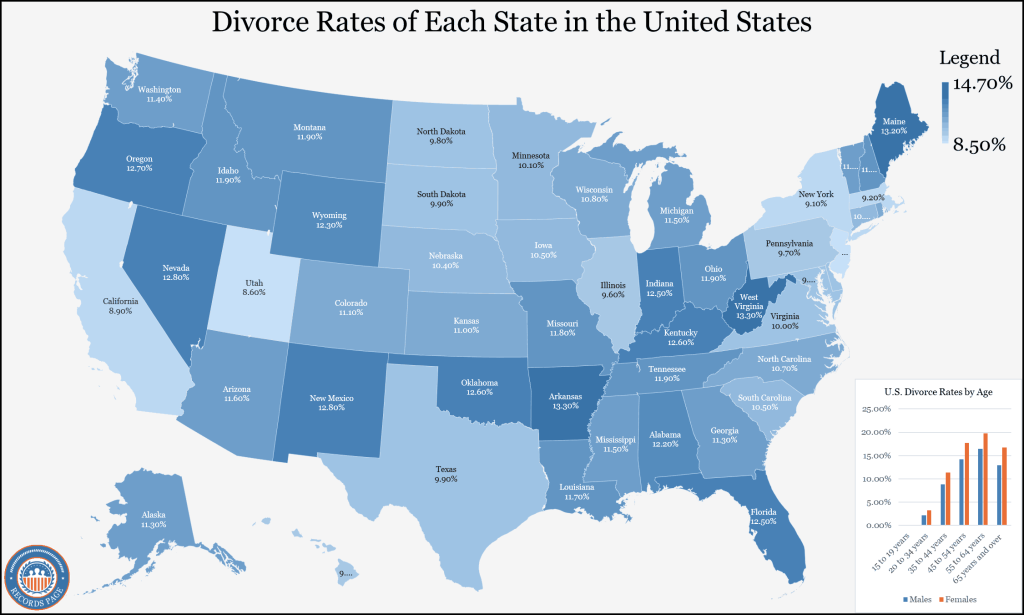
Older vital records can usually be viewed by anyone inside or outside the state, either online or through archives. Usually, the state makes vital records publicly available after 25 – 50 years from the event date.
Regardless if the public can access these records, countless U.S. citizens obtain copies or replacement certificates to apply for jobs, settle probate, or verify marital status. Luckily, record custodians of vital records are the easiest to locate and the least convoluted since it’s handled by the state rather than various federal, state, or local agencies.
Simply check the CDC’s vital records office guide, select the state of residency or where the major life event happened, and follow the instructions to request copies or replacement certificates.
Furthermore, nearly every state partners with VitalChek to provide vital records through their online ordering system. VitalChek is the fastest way to obtain vital records, but it is also the most expensive.
How Do I Find Out if Someone is Married or Divorced?
There are countless ways to find out if someone is married through public records, but searchers must know where to look.
Vital Records: Vital records should be the first place to check since it’s an official repository that’s publicly accessible in some states. Note most states keep this information private until 25 – 50 years* after marriage.
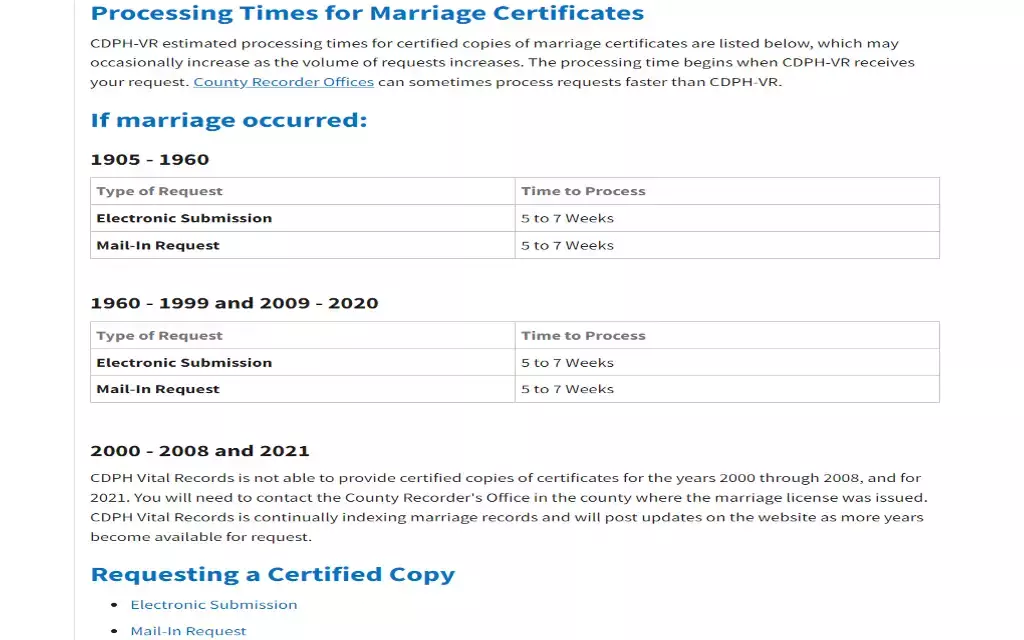
Court Records: If the interested party knows which county or jurisdiction the marriage took place, the local courthouse will keep records of the marriage certificate.
County Clerk’s Office: In many municipalities, the county clerk’s office helps file and track vital records such as marriage licenses.
Marriage Check Services or Private Investigators: There are countless marriage check services online, and a private investigator can also dig up information on people or observe them to see if they’re married.
Online Search: Using social media, google search operators, and checking the web for their username, and/or email can all shed light on someone’s marital status.
References
1Colorado Bureau of Investigation. (2023). Internet Criminal History Check System (ICHC). CBI. Accessed on June 1, 2023, from <https://www.cbirecordscheck.com/NonAccount/indivcheck.aspx>
2Clark County, Nevada. (2023). Warrant Status Check Information. Accessed on June 1, 2023, from <https://www.clarkcountynv.gov/government/departments/district_attorney/divisions/criminal/warrant_status_check_information.php>
3USAGov. (2023). State departments of corrections. Accessed on June 1, 2023, from <https://www.usa.gov/state-corrections>
4California Department of Corrections and Rehabilitation. (2023). CDCR. Accessed on June 1, 2023, from <https://www.cdcr.ca.gov/>
5California Department of Corrections and Rehabilitation. (2023). CDCR Inmate Locator. Public Inmate Locator System. Accessed on June 1, 2023, from <https://inmatelocator.cdcr.ca.gov/search.aspx>
6California Department of Public Health. (2023). Vital Records – Processing Times. Accessed on June 1, 2023, from <https://www.cdph.ca.gov/Programs/CHSI/Pages/Vital-Records-Processing-Times.aspx>
